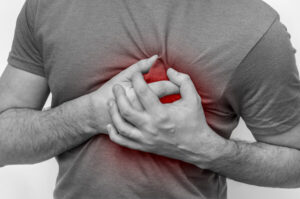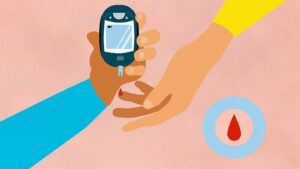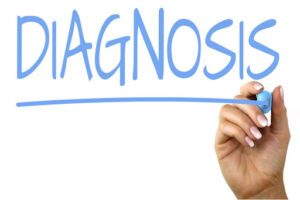Contents
What are Palpitations?

Heart Palpitations are the sensations in your heart like fast beats, pounding heart, or fluttering. Sometimes the heart misses a beat or sometimes there is an extra beat. These beats are specifically known as Ectopic beats.
People are mostly unaware of the frequency of the heartbeats, but sometimes it comes to notice because of various reasons. You can feel the sensations in your different body parts like throat, neck, etc. You can even feel it in your ear if you are laying down. These palpitations can be recorded at any time even if you are sleeping or resting.
These are mostly non-serious and can get better on their own with time. But sometimes they can reflect some serious condition. It can be the symptom of Arrhythmia, which is a serious heart condition in which there is an irregular heartbeat. It can be an alarming sign of Cardiac arrest.
What Are Symptoms of Palpitations?
Palpitations is not a very serious condition. However, in some cases, it can turn out to be a more serious condition. Every person can record different symptoms for palpitations, however, there are some common symptoms such as:

- Fluctuations in your heartbeat
- Fainting
- Shortness of breath
- Pounding of heart
- Nausea
- Sweating
What Are Causes of Palpitations?
There are multiple causes for palpitations. The causes can be related to the heart, medications, hormones, psychology, medical conditions, etc. Some of these causes are:
Fluctuations in Heart Rhythm
Arrhythmia is a condition when there is an irregular or abnormal rhythm in the heart. There are types such as:
- Atrial fibrillation in which the heart beats irregularly or at a faster speed
- Ventricular Tachycardia in which the normal heartbeat is very fast. This can lead to fainting or blackouts.
- Supraventricular Tachycardia (SVT) is an abnormally fast heartbeat
- Atrial Flutter is a very fast and irregular heartbeat.
Lifestyle Changes
Lifestyle plays a very important part in one’s health. It can either affect your health positively or negatively. These are some examples that can trigger palpitations:

- Rigorous Workout
- Spicy food or junk food
- Excessive alcohol
- Caffeine
- Illegal drugs
- Smoking
- Lack of sleep
Psychological Issues
Another factor that can cause palpitations is Emotional and psychological issues. Some examples of these are:

- Stress
- Anxiety
- Panic
- Depression
- Excitement
- Nervousness
- Anxious
Hormonal Changes
Women have hormonal changes at different points in her life. Heart palpitations can be a result of these. These hormonal changes happen during Menstruation, Pregnancy, or Menopause. These palpitations caused by these are mostly temporary and not a reason for concern.
Heart Conditions
Palpitations is mainly an issue with the heartbeat. This can be caused by various heart conditions like:
- When the heart is not able to pump blood into the body.
- If the heart is affected from birth.
- When the heart muscles become thick
- If there is a problem with heart valves.
Other Medical Reasons
Palpitations can be caused by other medical reasons such as:

- Hypoglycemia is a condition of low blood sugar
- Hyperthyroidism is a condition when the thyroid gland can produce excess thyroid hormones
- Anemia means a deficiency of red blood cells in your blood.
- Hypotension is a condition of low BP
- Dehydration
- Fever
Medications
Other than these medical and heart conditions, intake of some of these medications can also cause palpitations such as:
- High BP medications
- Antibiotics
- Antidepressants
- Antifungal
- Antihistamines
- Asthma inhalers
- Diet pills
Others
There can be heart palpitations when you are eating some kind of food which can be due to food sensitivity. In some cases, when you intake heavy meals which are rich in sugar, carbohydrates, etc. can also result in heart palpitations. Even when you take some herbal or
When Should You Visit Doctor?

There are very rare situations when you can notice heart palpitations. It usually goes unnoticed. Even if sometimes you notice it, these are not serious conditions and can get normal after a certain point in time. But if these last for a longer period of time or they are not improving, you should consult a Doctor. These are some of the rare situations in which you should consult a doctor.
- If these palpitations last for a longer period of time, or there is no improvement
- If you had any heart problems in the past
- Shortness in breath
- If there is any dizziness
- If you faint frequently
Diagnosis of Palpitations

To diagnose the reason for heart palpitation is very difficult. The doctor will keep asking you some questions about your medical history. He or she will inquire about your physical activities, stress levels, medicine intake, alcohol, menstrual cycle, sleeping schedule, caffeine intake, etc.
The doctor can look out for medical conditions that can cause these heart palpitations.
The doctor can carry out some tests that are:
- ECG: This is a test from which the doctor performs to detect problems in the heartbeat or the heart structure which can cause these palpitations.
- Echocardiogram: This is the test that helps to see blood flow and heart structure problem. It can help to create a moving picture of the heart using sound waves.
- Holter Monitoring: It is used to monitor heart palpitations that are not identified during the ECG test. You should keep monitoring them for about 2-3 days. This can be an option if the doctor suggests.
- Event recording: After recording irregular heartbeat from Holter monitor, the doctor may recommend you Event recorder. This recorder records the heartbeat for weeks and months. It records a heartbeat for a few minutes in a day. Whenever you feel palpitations you switch on the button to record it.
Treatment of Palpitations
Unless your doctor finds that you have a heart condition, heart palpitations very rarely require treatment. In the case of palpitations, the doctor will always advise you to be concerned about the symptoms of palpitations. You may not need any treatment. If the palpitations are related to certain foods, you should avoid those triggers. If you have heart disease or an abnormal heart rhythm, you may need medication, a procedure, surgery, or a device to correct the problem. It is important to keep all follow-up appointments with your doctor. The treatment that will suit you the best will be on the basis of these palpitations. If these get worse or suddenly happen more often, call your doctor.
If your palpitations are caused by a condition, such as an arrhythmia, treatment will focus on correcting the condition.
How To Prevent Palpitations?
Prevention will also be based upon the cause of palpitations. Sometimes doctors think that the elaborated treatment methods can be avoided to treat these palpitations. He or she will suggest some of the tricks to control the symptoms of palpitations or cure them.
There are some of the tips that you can use to prevent these such as:

- Start relaxing using breathing exercises.
- Keep a check on sugar and cholesterol levels.
- Avoid using tobacco/ nicotine products.
- Do not smoke or consume alcohol.
- Avoid using caffeine.
- Start doing exercises on a daily basis.
- Follow a good diet. (ask the doctor what nutrients does your body need and prepare a chart according to that)
Sometimes the reason for palpitations is due to heart diseases like atrial fibrillations or ischemic heart disease. It is comparatively riskier for the patient than any other cause of palpitations.
According to this situation, the risk factors that need to be controlled are high blood sugar levels (hyperglycemia), High blood pressure, smoking, alcohol, etc. Avoiding these will always help you to avoid these palpitations. Sometimes taking care of these prevention points benefit you from any medicines that are used for the treatment.
You can follow these preventive measures alongside treatment to cure the ailment. You should only avoid the treatment procedure if it is advised by the doctor.
If you are having any symptoms of palpitations, you should start caring for it before it’s too late. If you are having any problem sleeping, concentrating at work, etc. Consult a doctor first. Do not eat anything without consultation from the specialist as it can negatively affect your health. Take necessary precautions beforehand to prevent these palpitations.
A Word From MantraCare
Your mental health — your psychological, emotional, and social well-being — has an impact on every aspect of your life. Positive mental health essentially allows you to effectively deal with life’s everyday challenges.
If you are looking for affordable Online Counseling MantraCare can help: Book a trial therapy session



Comments are closed.